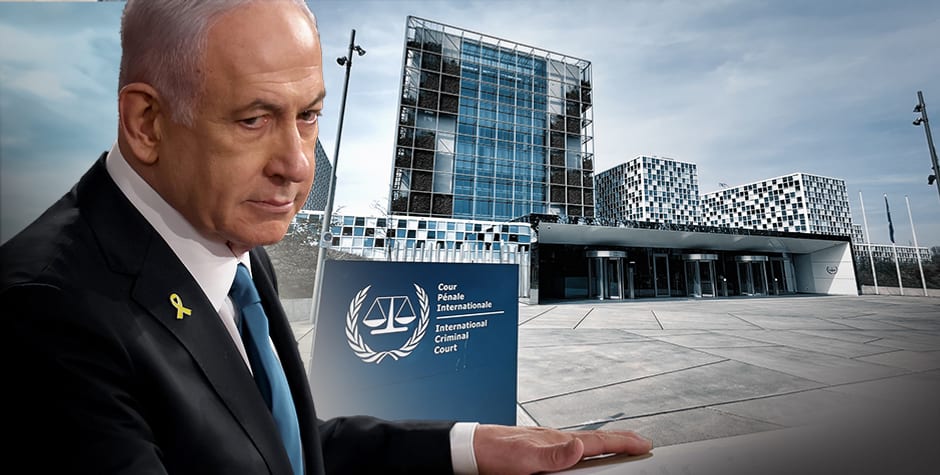Major Amicus Brief Filed at the International Criminal Court in Defense of Israel’s Interests and To Stop Unlawful Arrest Warrants From Being Issued for Israeli Prime Minister Benjamin Netanyahu and Other Israeli Leaders
Listen tothis article
On May 20, 2024, the Prosecutor of the International Criminal Court (ICC) at The Hague filed applications for arrest warrants for Israeli Prime Minister Benjamin Netanyahu and Minister of Defense Yoav Gallant on charges of supposed war crimes. The Prosecutor also filed applications against Yahya Sinwar, Mohammed Diab Ibrahim al-Masri, and Ismail Haniyeh, Hamas terrorists responsible for the genocidal attacks perpetrated against the Jewish people on October 7, 2023.
Several countries have condemned the ICC’s actions against the Israeli leaders. Even the Biden Administration issued a statement calling the ICC’s actions “outrageous.” Following the applications for arrest warrants, the United Kingdom petitioned the ICC for leave to submit observations on the implications of the Oslo Accords on any claimed jurisdiction by the Court, a question that the Court previously stated it would resolve if any such applications for arrest warrants were submitted. The ICC subsequently granted the U.K.’s request and allowed other interested parties to submit a request to submit their observations.
The ACLJ – through our international affiliate, the European Centre for Law and Justice (ECLJ), which has a special consultative status at the United Nations – submitted a request for leave to submit amicus curiae observations. On July 22, 2024, the Court granted our request, and we just filed our amicus brief.
As a background to help you understand our brief better, the ICC was created by a treaty called the Rome Statute. Under international law, a treaty is only binding on States that become parties to it. Since many States, such as the United States and Israel, are not parties to the Rome Statute, the ICC cannot exercise jurisdiction over nationals of those States. However, the Rome Statute has a provision that allows ICC jurisdiction if the crime is committed by a national of a non-party State on the territory of a State Party to the Rome Statute. The idea is that since a State has jurisdiction to prosecute any person (including a foreign national) who commits a crime on its territory, a State can delegate that jurisdiction to the ICC.
When the Palestinian Authority acceded to the Rome Statute, we argued that, since “Palestine” is not a State, it could not become a State Party to the Rome Statute and, thus, could not delegate jurisdiction to the ICC. The ICC, however, did not agree and allowed “Palestine” to become a party to the Rome Statute.
Another important aspect regarding the current brief we have just filed is the Oslo Accords – agreements between the Palestinian Liberation Organization (PLO) and Israel that were signed in 1993 and 1995. In anticipation of a two-State solution, the Oslo Accords created a Palestinian governing entity called the Palestinian Authority (PA) and gave it jurisdiction over aspects of Palestinians’ lives and in specific areas in the Gaza Strip and the West Bank. The Oslo Accords, however, did not grant any jurisdiction over Israeli nationals to the PA. Thus, the PA cannot delegate that jurisdiction to the ICC.
In our recent amicus brief, we have made several points as they pertain to the Oslo Accords and the ICC jurisdiction.
First, we argued that the Oslo Accords must be considered as relevant and valid in the determination of ICC jurisdiction over Israelis. This is evident in the Prosecutor’s own previous statements, referencing the Oslo Accords as limiting the PA’s jurisdiction. Further, the Oslo Accords are clear in that all jurisdiction over Israeli citizens is retained by Israel and Israel alone. Additionally, the Oslo Accords are recognized regularly in practice by the parties (Israel and the PLO) and the international community generally, including the United Nations.
Second, given that the ICC considers “Palestine” a state for the “strict purpose of the Rome Statute only,” the presumed “state of Palestine” is not a sovereign state, which would normally have inherent jurisdiction. Since the presumed state has no inherent jurisdiction, it cannot transfer the non-existent jurisdiction to the ICC. A finding of jurisdiction would require going outside the scope of considering Palestine a state for the strict purposes of the Rome Statute only, something absolutely against the ICC Prosecutor’s initial assertion regarding Palestine’s limited, presumed status.
Third, our brief points out that a finding of ICC jurisdiction would violate several fundamental international law principles of treaty interpretation, as doing so would go against the clear text, context, and the intended purpose of the Oslo Accords.
Given the Court’s record, we are not optimistic that it will see reason in this case. However, we hope that, because the Court is being forced to face its own previous logic and long-standing international legal principles, it will concede that it does not have jurisdiction over Israeli nationals and will subsequently drop the charges against Prime Minister Netanyahu and Defense Yoav Gallant.
